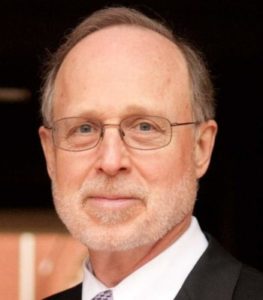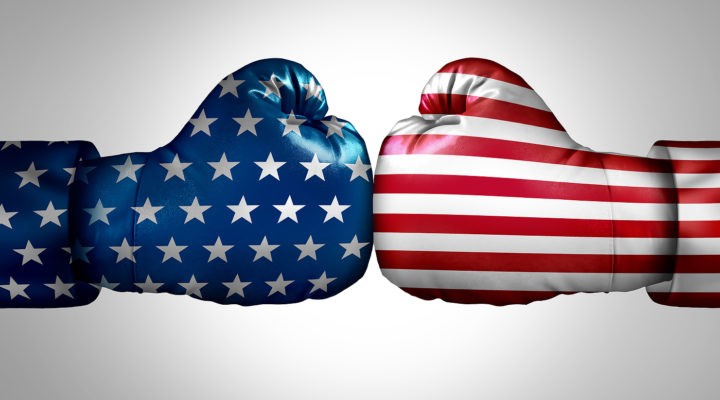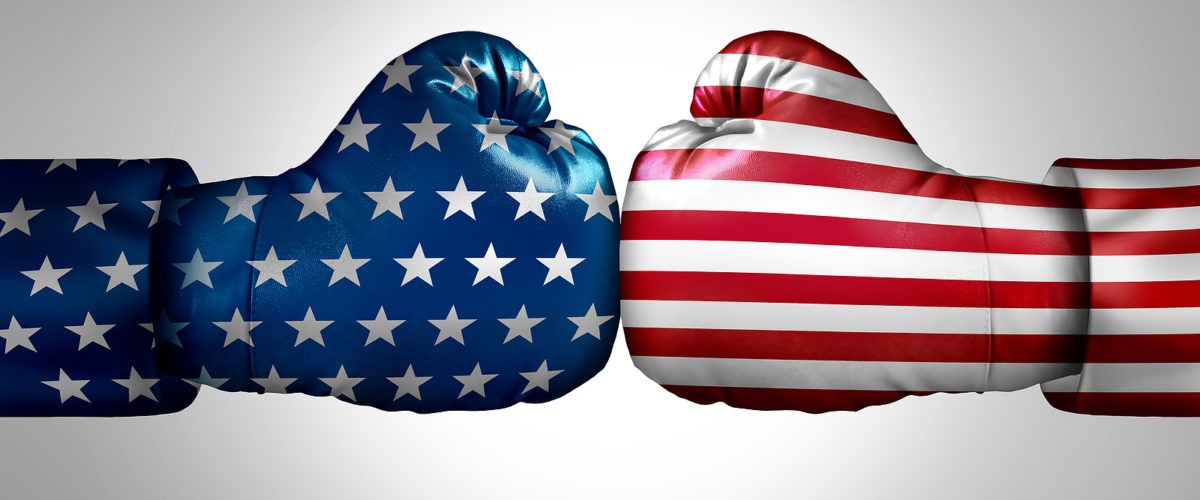Sioux City, like most towns in the rural Midwest, went heavily for Trump in 2016. It was there that the Republican candidate claimed he could shoot somebody on Fifth Avenue without losing votes. Many of the Sioux Center residents interviewed in a recent New York Times article are anticipating a repeat victory. Wherever they go, Trump-Pence yard signs and MAGA hats abound.
“I feel like on the coasts, in some of the cities and stuff, they look down on us in rural America,” one resident told the Times reporter. “You know, we are a bunch of hicks and don’t know anything. They don’t understand us the same way we don’t understand them … . You joke that we don’t get it, well, you don’t get it either. We are not speaking the same language.”

Alan Bean
He’s right. As we head into the weirdest election season in living memory, America is awash in mutual incomprehension. There are two Americas. And they aren’t on speaking terms.
In fact, leading voices in both camps insist that America is dying from a cancer (the folks on the other side) which must be ruthlessly exterminated.
I realize that most Americans defy simple labels. But, in the late summer of 2020, there are only two marketable messages on offer.
The first is the language of antiracism. Ibram Kendi is the most articulate spokesperson for what I call antiracist spirituality. Kendi concluded The End of Denial, a recent essay in the Atlantic, with an appeal for immediate change: “Abolish police violence. Abolish mass incarceration. Abolish the racial wealth gap and the gap in school funding. Abolish barriers to citizenship. Abolish voter suppression. Abolish health disparities. Not in 20 years. Not in 10 years. Now.”
Although Kendi rarely attends church these days, he was raised with a form of Black liberation theology. Christianity was closely identified with the struggle against systemic injustice. Progressive Christianity, in its various expressions, speaks a similar language. Antiracist spirituality is visionary and unapologetically utopian. You don’t have to be conventionally religious to believe it; but the religious fervor is hard to miss.
The second marketable message on offer is white Christian nationalism. America is God’s chosen vessel in a sinful world. Traditional, one-man-one-woman marriage is God’s good gift. So is limited government and free enterprise capitalism. The American military, law enforcement and the Second Amendment exist to protect the blessings God has bestowed on God’s chosen people.
For the past 20 years, I have worked with Friends of Justice, a faith-based criminal justice reform organization. I use actual cases of injustice, typically in small towns in the South, to illustrate the systemic brokenness of American justice. Earlier this week, while researching a case in rural Texas, a lawman’s Facebook page directed me to a video of his pastor’s latest sermon.
It was the purest expression of white Christian nationalism I have ever witnessed.
A huge American flag was planted next to the pulpit. The altar was bathed in red, white and blue. “If we ever forget that we are one nation under God,” a banner read, “then we will be a nation gone under.”
The 50-minute sermon promised “seven ways Christians can destroy America.” Although the preacher only made it to number three, there was plenty of content. He confessed his love for the president. He condemned the Black Lives Matter movement. He castigated the evils of “Hellywood.” He denounced “so-called progressive Christianity.” He deplored the apostacy of late-night comics (I suspect he was thinking of Stephen Colbert). And he listed the four big issues at stake in the presidential election: ending abortion, fighting the gay agenda, supporting Israel and maintaining control of the judiciary.
“You will never hear a sermon that blends antiracist rhetoric with the familiar tropes of white Christian nationalism.”
“How have we been duped into thinking that a preacher doesn’t have the right to stand in this pulpit and speak against the ungodliness of politics in America today?” the preacher asked. “Those who unashamedly mock the word of God and the Savior who died for them are running rampant in America today … they flaunt their immorality … and they promote their anti-biblical lifestyles. And here we sit and we say, ‘Oh well, we’ve gotta be kind, we gotta love them.’”
“Liberals, socialists and infidels” remain in a “godless state,” the preacher said, so there is no reasoning with them. “The walls of freedom and decency and morality are being stormed in a way in America that’s unprecedented,” he warned, “and we, God’s people, must be willing to stem the tide of immorality and ungodliness and rebellion and anarchy in this nation.”
This is white Christian nationalism, pure and undistilled. This message usually comes with more subtlety and nuance, even from hard-right preachers like Robert Jeffress. Similarly, you will rarely hear antiracist religion proclaimed with the uncluttered directness of Ibram Kendi.
Options abound in the American religious marketplace, of course, but most of them are too complicated, obscure or dated to resonate with a mass audience. The two hot tickets are antiracist spirituality and white Christian nationalism.
You will never hear a sermon that blends antiracist rhetoric with the familiar tropes of white Christian nationalism. Never. The two gospels are oil and water. They don’t mix.
And, as our friend from Sioux City says, a mutual incomprehension plagues both camps: “We are not speaking the same language.”
The gospel of antiracism is an urban phenomenon. It plays especially well in academic settings. Its spiritual essence is increasingly influential in Democratic politics. White Christian nationalism thrives in the rural heartland and the megachurches of suburbia. It is overtly a feature of Republican politics.
Preachers in both camps will tell you that the cancer devouring America requires radical surgery. The opposition must be vanquished.
It’s not going to happen.
“I believe this government cannot endure, permanently half slave and half free,” Abraham Lincoln argued in 1858. “It will become all one thing, or all the other.”
In a sense, Lincoln was prophetic. At the conclusion of the Civil War, slavery was abolished in these United States. But as Heather Cox Richardson argues in How the South Won the Civil War, the Confederacy is always making a comeback.
“Maybe we can’t master the other team’s mother tongue. But we can pick up a few phrases to indicate we’re trying.”
There will be no funeral for either antiracist spirituality or white Christian nationalism anytime soon. For the rest of my lifetime (I am 67), America will go limping between two spiritual options. No hand will be raised in victory.
Antiracist sentiments thrive among the young while the white Christian nationalist constituency skews older. So the future may favor the former over the latter. But that’s just a guess. As Doris Day cautioned back in 1956, “the future’s not ours to see.”
Total victory may well be achieved in rural Texas or Cambridge, Mass., but the ideological tug-of-war that has divided our nation (and our families) has legs.
Progressive Christianity should embrace antiracist spirituality. It is a logical extension of the kingdom Jesus preached. But the kingdom also calls us to forgive our enemies. We are called to pray for our ideological opposites.
The demonizing stops with us.
Maybe we can’t master the other team’s mother tongue. But we can pick up a few phrases to indicate we’re trying. Maybe we can’t understand the fear at the heart of white Christian nationalism. But we can set a place for everyone at the kingdom table.
Radical inclusion demands radical grace. And that, should we choose to accept it, is our mission.
Alan Bean serves as executive director of Friends of Justice, an alliance of community members that advocates for criminal justice reform. He lives in Arlington, Texas.
Related articles:
“We are Cain”: Owning up to the reality of racism in America


